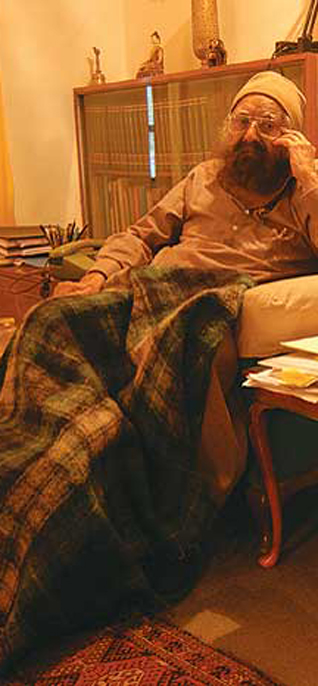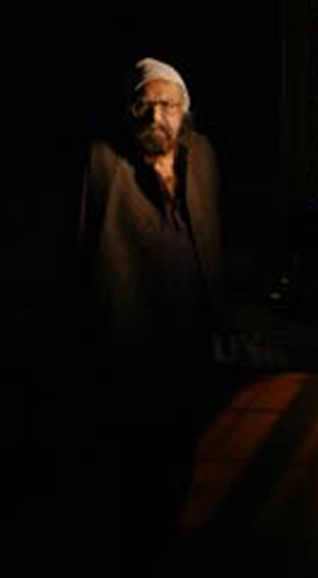Books
Staring Into The Abyss:
Khushwant Singh's Personal Struggles With Organized Religion
A Book Review by ARUTI NAYAR
AGNOSTIC KHUSHWANT: THERE IS NO GOD! by Khushwant Singh, with Ashok Chopra. Hay House, India, 2011. pp 245, Rs. 299. ISBN-10: 9381431116; ISBN-13: 978-9381431115.
This is not vintage Khushwant Singh. Neither are there any digs and asides that leave a lot to imagination. There is no double entendre or mischievous dallying with things taboo, another Khushwant-defining feature.
On offer is a well-written book that is immensely informative. Agnostic Khushwant. There is no God! is an easy read about different religions - Sikhism, Islam, Hinduism and Buddhism.
With great skill and dexterity, he unravels the complex philosophy underlying religions in a lucid style which is readable. The book has been divided into 14 chapters for a macroscopic view on various aspects of the faiths, their scriptures and even internecine problems that beset them and their practitioners.
The chapters The Beauty of the Quran, Anti-Muslim Prejudices and The Significance of The Ramzaan Fast are particularly informative. They give the reader an insight into Islam and help to correct the perspective by deconstructing many commonly held fallacies and biases against Islam and Muslims.
More often than not, the reasons for biases are lack of knowledge and information. If only at least the educated people followed a more informed approach, many prejudices would wither.
In an exemplary manner, the writer uses strong logic and reasoning to prove his point and does not fall into any mystical claptrap. Ashok Chopra, who has collaborated with Khushwant Singh, in a precise and sparkling Foreward brings out the special bond that he shares with the author, so much so he has lost count of the books written by the latter that he, Chopra, he has published.
The chapters that deal with various aspects of Sikhism -The Sikh Religion and The Beauty of the Adi Granth, Sikh Prayers and Guru Nanak and Guru Gobind Singh dwell on the lesser-known aspects and the lyrical beauty of verses and juxtapose the turbulent times in which the Gurus lived historically with their teachings.
Khushwant quotes extensively to bring out not only the spiritual or mystical power but also the sheer lyricism of the poetry in the Guru Granth Sahib and other verses. Even when he discusses the finer points of Sikhism and the teachings of Guru Nanak and the tenth Guru Gobind Singh, it is as a rationalist and not as a person who is either overawed or blinkered by the sheer force of faith.
The author’s pronouncements are not merely statements but backed by an analytical rigour. He quotes and brings out the power of poetry in religious texts.
The Quran, he says, is very musical, as is the Guru Granth Sahib. He even displays a technical knowledge of the metric compostions.
For instance, we learn that Asa di Vaar in the Guru Granth is composed in the form of a heroic ballad and is set to the musical mode of raag Asa and it is divided into staves (sloks) and stanzas (paurris).
It is essays like God is Not For Sale and The Need For a Ban on Religious Processions that reach out to the target the audience because, true to form, he debunks hypocrisy and brings out incongruities in a provocative manner.
For instance, he scoffs at the gradation of akhand paatths and how the raagis of a jathaa asked for more money if they got a Japanese harmonium! No wonder the veteran author does not believe in giving money at places of worship and only opts for direct charity. He feels, Hindu priests and Sikh raagis have acquired vested interests in religious practice.
Until and unless priests are divested of their stranglehold on places of worship, there is little chance of worship and there is little chance of their being restored as havens of spirituality.
He explains how instead of entering into a pointless debate on whether or not God exists, it is more important to bear in mind that belief in the existence of God has little bearing on making a person a good or a bad citizen. The tone is set in the first chapter itself: The need for a new religion - Without a God. He questions the relevance of God and shocks the reader in his inimitable manner and then goes on to explain after holding him captive. "One can be a saintly person without believing in God and a detestable villain believing in him. In my personalised religion, There Is No God!
He is of the view that religion has proved to be more harmful than beneficial and, in the process, debunks astrologers and the breed of so-called ‘godmen’.
The chapter on meeting the Dalai Lama is evocative as the author explains how the aura that His Holiness exuded was contagious as were his guffaws. He writes: "The Nobel Committee had done well in awarding him the peace prize in 1989 because he is a man of peace. He has suffered many wrongs but has never uttered an angry word in protest. He has brought solace to millions of people who are troubled by the way world is going today."
Khushwant has studied all religions very thoroughly and makes available his knowledge without obfuscation and use of jargon. He does not throw abstruse philosophical concepts in the face of readers. And is bang on target when he declares that the role of religion in present-day society has shrunk to minimal proportions and it is only "Providing facile means of forgiveness through performance of pilgrimage or some trite from of penance or the intercession of godmen."
In this book, this most-read columnist informs and educates. This is a big change from his usual offerings where he is the entertainer par excellence. Kudos to his fair-minded rationality, objectivity and secularism. Readers deserve more of such books from the veteran.
[Courtesy: Tribune. Edited for sikhchic.com]
March 18, 2012
Conversation about this article
1: Baldev Singh (Bradford, United Kingdom), March 18, 2012, 12:23 PM.
Brilliant! Most thinking and decent humans - Sikhs included - would agree with S. Khushwant Singh. Guru Nanak rejected all institutionalized religion 500 years ago, but today the 'followers' of Guru Nanak have fallen into the very same trap of Hindu-Muslim superstitions and sectarianism which go directly counter to the Guru's teachings.
2: Raj (Canada), March 18, 2012, 11:41 PM.
Only thing "organized" about Sikh religion is Guru Granth Sahib, other than it rejects every dogma offered by other religions. To think that Khushwant Singh offers anything new or novel is ridiculous.
3: Parvin (Santa Clara, California, U.S.A.), March 19, 2012, 1:12 AM.
Khushwant Singh is a reputed writer, with due regards. If we take a little time to read and understand our own Guru Granth, then we don't need to rely on the interpretations of God or religion from others. Ik Oankar - the openng words of Guru Granth - say it all for us: The One.
4: N. Singh (Canada), March 19, 2012, 3:30 AM.
I agree with Raj.
5: Sangat Singh (Kuala Lumpur, Malaysia), March 19, 2012, 7:54 AM.
Here is a self portrait of man who is both detested and loved at the same time. His self perpetuated image of a drinking man and his imaginary sexual escapades are deliberately nurtured because they sell in the Indian market. How many of us can answer Sheikh Farid's call? "Fareeda jay too akal lateef kaalay likh na laykh/ aapnahay gireeban meh sir neeaava jar daykeh" [GGS:1378.4] - 'Fareed, if you have a keen understanding, then do not write black marks against anyone else. Look underneath your own collar instead.' Before we pick up the stone to throw, remember that even the so-called godmen are not free of hypocrisy. They regularly gulp cough mixture by the gallon that has alcohol in it. Let's instead look at the good work done by Khushwant Singh. How many of us could return a prestigious national award/medal as a protest of 1984 ... he remains the sole one. His opus "History of Sikhs" remains an outstanding work and so do his renderings of gurbani into chaste English. His Sikhi should not be questioned, when we don't even understand what we say in our daily ardaas: "dekh key unditth kitaâa". I know for sure that the lessons he learnt in the lap of his mother would never have gone awry. I remember when an eminent visiting preacher said of his village, "What can I preach here?" when he saw a poor Sikh labourer goading on his khota (donkey) loaded with bricks and reciting Sukhmani Sahib in a melodious voice while doing so. Like him, we too should simply learn from others, instead of finding fault.
6: Sandeep Singh Brar (Canada), March 19, 2012, 4:44 PM.
The voracity of the Gurus' views regarding those who do not believe in God is pretty clear: Guru Arjan - "Without meditating in remembrance on the Lord, one's life is like that of a snake. This is how the faithless cynic lives, forgetting the Naam, the Name of the Lord. ||1|| One who lives in meditative remembrance, even for an instant, lives for hundreds of thousands and millions of days, and becomes stable forever. ||1||Pause|| Without meditating in remembrance on the Lord, one's actions and works are cursed. Like the crow's beak, he dwells in manure. ||2|| Without meditating in remembrance on the Lord, one acts like a dog. The faithless cynic is nameless, like the prostitute's son. ||3|| Without meditating in remembrance on the Lord, one is like a horned ram. The faithless cynic barks out his lies, and his face is blackened. ||4|| Without meditating in remembrance on the Lord, one is like a donkey. The faithless cynic wanders around in polluted places. ||5|| Without meditating in remembrance on the Lord, one is like a mad dog. The greedy, faithless cynic falls into entanglements. ||6|| Without meditating in remembrance on the Lord, he murders his own soul. The faithless cynic is wretched, without family or social standing. ||7||" [GGS:239]
7: N. Singh (Canada), March 19, 2012, 5:17 PM.
Compare the actions of this man to those of Bhai Balwant Singh. Actions speak louder than words ...
8: Balbir Kaur (United Kingdom), March 19, 2012, 5:55 PM.
N. Singh ji: Therein lies the problem. If we had more Khushwant-Singhs, we wouldn't need Bhai-Balwant-Singhs. Quantity gives rise to quality, which - like cream - rises to the top. If we don't allow the Khushwant Singhs to thrive, there won't be enough of them to give rise to the quality we would like to have in them. I don't believe you have given this much thought, I'm afraid, in your knee-jerk rush to insult the likes of Khushwant Singh every time their names appear in these pages.
9: R. Singh (Canada), March 21, 2012, 6:08 PM.
We need to learn to disagree without insulting others. There, Balbir Kaur ji has hit the nail on the head. How many people have responded to or held a dialogue with Khushwant Singh or written anything, giving an alternative view so far?
10: Artika Bakshi (Sri Lanka), April 13, 2012, 3:00 AM.
Interesting read! Will definitely buy this book as am intrigued by religion and apirituality. I do agree with S. Sangat Singh ji.





